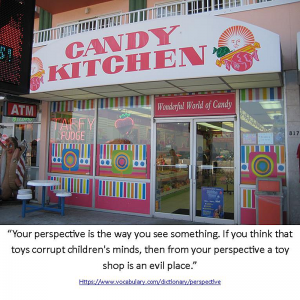The Power of Perspective
11 February 2020
Realizing that my column is routinely longer than what is normal, I considered making changes that might lessen my word count. Doing so would adversely impact what I hope is my approach to important topics. That is, presenting thoughtful discussion of a topic while supporting that discussion with logical flow and sound facts. In sharing my challenge with my wife, Denise, she suggested that I start each column with a brief statement summarizing the column’s central point. Doing so will, hopefully, allow individuals to quickly decide whether they will read the lengthy piece. I decided to follow Denise’s advice. Commencing with this column, each one will open with a “Column Gist”.

Column Gist: The perspective with which a person views whatever life presents dramatically impacts how they respond in every instance. Given this fact, every individual should give serious attention to his or her perspective. Doing so requires a level of self-reflection that is extremely rare in America. This lack of self-reflection allows for holding onto perspectives that result in unreasonable, even destructive, actions. I am convinced that flawed perspectives are at the heart of many of the problems we face in America.
My latest period of intense attention to the power of perspective was prompted by seeing the movie “Just Mercy”. What follows is a summary of the movie from www.rottentomatoes.com:
A powerful and thought-provoking true story, “Just Mercy” follows young lawyer Bryan Stevenson and his history-making battle for justice. After graduating from Harvard, Bryan had his pick of lucrative jobs. Instead, he heads to Alabama to defend those wrongly condemned or who were not afforded proper representation, with the support of local advocate Eva Ansley. One of his first, and most incendiary, cases is that of Walter McMillian, who, in 1987, was sentenced to die for the notorious murder of an 18-year-old girl, despite a preponderance of evidence proving his innocence and the fact that the only testimony against him came from a criminal with a motive to lie. In the years that follow, Bryan becomes embroiled in a labyrinth of legal and political maneuverings and overt and unabashed racism as he fights for Walter, and others like him, with the odds-and the system-stacked against them.
Bryan Stevenson and Walter McMillian are black, while the 18-year-old murder victim was white. When the movie was over, given the legitimate focus on mistreatment, racism, and discrimination based on the accused being black, I was troubled. I was so troubled that I was still sitting in the theater when everybody else had left and two young people were waiting to clean the area.
I was troubled because of feeling confident that far too many black Americans would view this movie with a Civil Rights Era perspective, rather than one based on current conditions in America. I sat there grieving for our country because failure, by so many, to adjust perspective is wreaking havoc on our country. Let me be clear: I am addressing concern for black perspectives, but the power of perspective applies to every person.
Https://www.vocabulary.com/dictionary/perspective provides a revealing definition and example of perspective: “Your perspective is the way you see something. If you think that toys corrupt children’s minds, then from your perspective a toy shop is an evil place.” It is the truth of this statement that caused my troubled response to what is a moving and extremely well-done movie. If a black person holds a perspective based in the 50s and 60s, as opposed to present conditions in America, that person will be more likely to see racism where it does not exist. We live in a time when this circumstance is rampant, and the results are downright scary.
Within twenty minutes of leaving the movie theater, I had an experience that confirmed my view that perspective must be based on current conditions and every person must have the capacity to adjust their perspective. I was approaching a crosswalk and still struggling with that movie and its likely impact. A black lady walked up alongside me and we started a conversation. I asked where she was from and she said “Birmingham, Alabama”. Since the movie told of actual events that took place in Alabama, I told her that we had just seen “Just Mercy”. She responded that she wanted to see the movie.
Given that she was from Alabama, I asked how things were going in the state. By this time, we were on the other side of the street. She stopped and stood still; then, looking directly at me, answered my question with clarity and total believability. The lady said that she was past her mid-70s and grew up in Birmingham during the Civil Rights Movement. After becoming an adult, she moved away for many years. Deciding to move back a few years ago, she expected to find a challenging situation…obviously based on her memories of the Civil Rights Era. That was her perspective.
However, her assessment was that Birmingham is a much better place than she expected to find upon returning. This lady explained that she lives in a quality neighborhood surrounded by supportive and cordial neighbors, most of whom are white; frequents a senior citizen center where there is a mix of participants by race, ethnicity, culture, income level, and so forth, but they all get along extremely well. Then came a surprising comment. She said that when Donald Trump was elected president, her expectation was that the good racial conditions of her city would decline, but there was no change.
After all of the positives, she said, with obvious sadness, that the neighborhood where she grew up is in very bad condition now. Then a closing comment that, as black Americans, we are hurting ourselves. She said, in Birmingham, blacks are killing each other in large numbers, even babies. The headline of an article by Paul Kersey confirms her assessment. That headline is “In 2018 Birmingham, Alabama (a 75% Black City), Not One of the 99 Criminal Homicides Involved a White Male Suspect”.
After many years, this lady went home to Alabama with expectations based on experiences and observations from the Civil Rights Era. Her perception was set. To her credit, she adjusted that perception in light of conditions much improved from the horrible circumstances she saw and experienced during her youth and early adult years in Birmingham.
Therein is one of the great challenges for all of us. It is to recognize when our perspective is out of sync with present reality and adjust accordingly. Failure to consistently and faithfully take this action can not only adversely impact us as individuals but, to varying degrees, adversely impact society in general.
I contend that failure to shift in perspective is happening across America and we are paying a high price because of the failure. What is happening in Fayetteville by way of black citizens opposing the building of the North Carolina Civil War and Reconstruction History Center is, for me, the result of a failure to adjust perspectives. Here is an opportunity to accurately educate citizens, young and old, help heal the destructive racial divide, while producing substantial positive economic impact. Based on the contention that the people -mostly white- who are leading the effort will not accurately tell the Civil War and Reconstruction story and will glorify the Civil War, a movement that will likely kill this very promising project is underway. The relevant question is what perspective might a person hold that would result in this level of distrust?
It has to be one from some period prior to the present. I have thoroughly researched this project and talked with people, black and white, who are involved with it. Nothing I have seen supports the distrust perspective obvious in this opposition.
This is just one case where I contend the power of perception is at work in a very negative way and needs to be realigned to sync with current conditions. This kind of faulty perception is running rampant in America and doing great harm. We, all of us, would do well to learn from that 75+ year-old black lady in Birmingham




